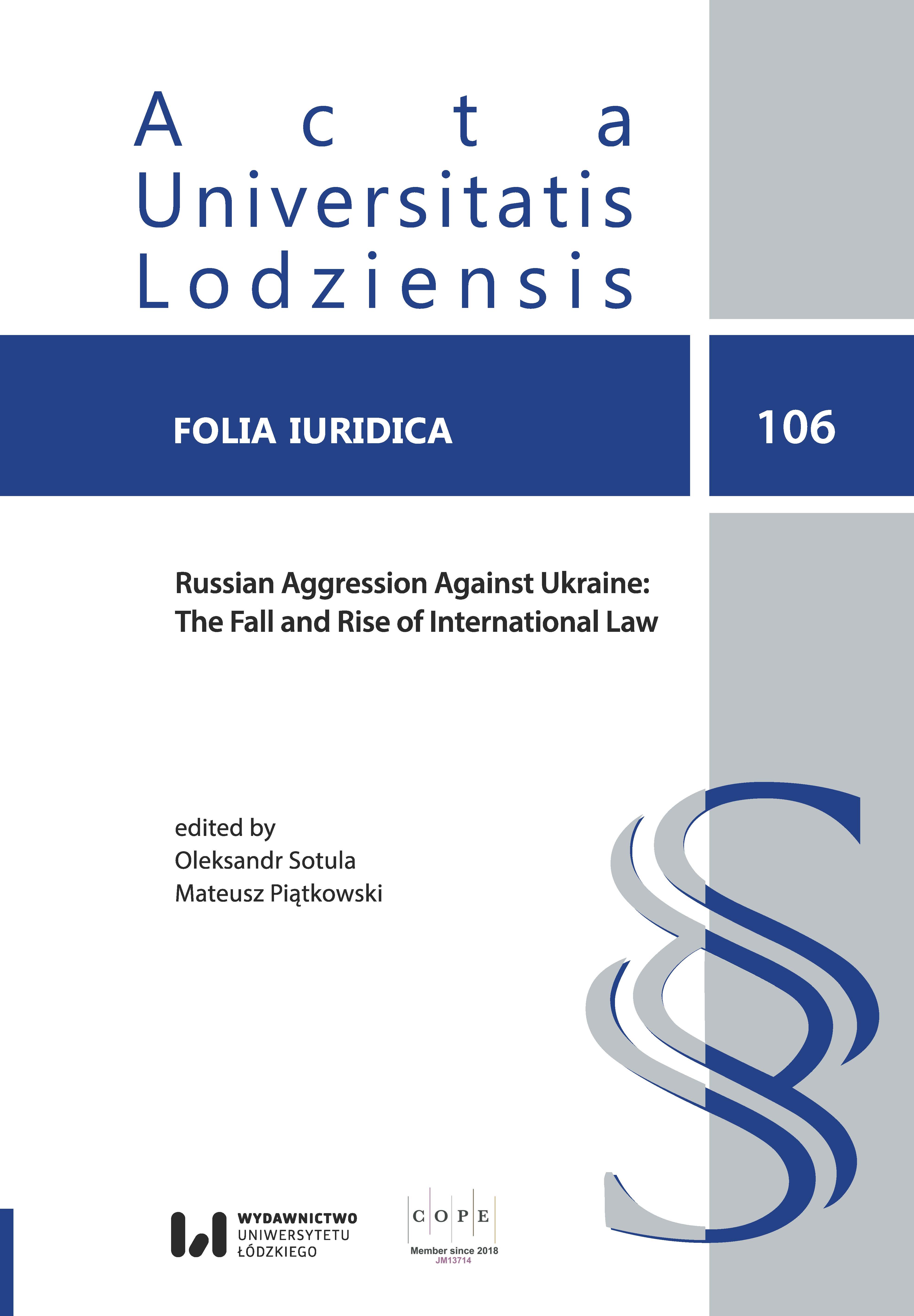Status prawny cywilnych hakerów w świetle międzynarodowego prawa humanitarnego
DOI:
https://doi.org/10.18778/0208-6069.106.06Słowa kluczowe:
cyberwojna, haktywiści, cywilni hakerzy, ezpośrednie uczestnictwo w działaniach zbrojnych, wojna rosyjsko-ukraińskaAbstrakt
W odpowiedzi na rosnącą liczbę cywilnych hakerów uczestniczących w różnego rodzaju aktywnościach cybernetycznych, Międzynarodowy Komitet Czerwonego Krzyża opublikował wytyczne dotyczące podejmowanych przez nich tego rodzaju działań. W niniejszym artykule omówiono regulacje prawne dotyczące cywili, którzy biorą udział w działaniach zbrojnych w cyberprzestrzeni, opierając analizę przede wszystkim na koncepcji bezpośredniego uczestnictwa w działaniach zbrojnych w kontekście wojny cybernetycznej. Ze względu na szczególny charakter wojny cybernetycznej, podkreślono potrzebę zastosowania kontekstowego i indywidualnego podejścia celem określenia statusu prawnego cywili zaangażowanych w działania zbrojne w cyberprzestrzeni. W artykule omówiono trudności w definiowaniu cywili w wojnie cybernetycznej, zasady rozróżnienia i proporcjonalności, kryteria kwalifikacji cywila jako „bezpośredniego uczestnika działań zbrojnych” oraz koncepcję ciągłej funkcji bojowej, która odróżnia cywilów stale zaangażowanych w działania zbrojne w cyberprzestrzeni od tych działających okresowo czy ad hoc. Poruszono również problemy związane z aspektami czasowymi operacji w cyberprzestrzeni i koncepcję „revolving door”, która utrudnia precyzyjne określenie statusu prawnego cywilnych hakerów w kontekście wojny cybernetycznej.
Pobrania
Bibliografia
Akande, Dapo. 2010. “Clearing the Fog of War? The ICRC’s Interpretive Guidance on Direct Participation in Hostilities.” The International and Comparative Law Quarterly 59(1): 180–192.
Google Scholar
Buchan, Russell. 2016. “Cyber Warfare and the Status of Anonymous under International Humanitarian Law.” Chinese Journal of International Law 15(4): 74–772.
Google Scholar
Delerue, Francois. 2014. “Civilian Direct Participation in Cyber Hostilities.” IDP IDP Revista de Internet Derecho y Política 19: 3–17.
Google Scholar
Dinniss, Heather. 2012. Cyber Warfare and the Laws of War. Cambridge Studies in International and Comparative Law. Cambridge: Cambridge University Press.
Google Scholar
Fleck, Dieter. Ed. 2013. The Handbook of International Humanitarian Law. 3rd ed. Oxford: Oxford University Press.
Google Scholar
Henckaerts, Jean-Marie. Louise Doswald-Beck. 2005. Customary International Humanitarian Law. Geneva: International Committee of the Red Cross.
Google Scholar
Hoffman, Michael. 2003. “The Legal Status and Responsibilities of Private Internet Users under the Law of Armed Conflict: A Primer for the Unwary on the Shape of Law to Come.” Washington University Global Studies of Law Review: 415–426.
Google Scholar
Kilovaty, Ido. 2016. “ICRC, NATO and the U.S. – Direct Participation in Hacktivities – Targeting Private Contractors and Civilians in Cyberspace Under International Humanitarian Law.” Duke Law & Technology Review 15: 1–38.
Google Scholar
Lazar, Seth. 2013. “Necessity and non-combatant immunity.” Review of International Studies, British International Studies Association 40(1): 53–76.
Google Scholar
Longobardo, Marco. 2017. “(New) Cyber Exploitation and (Old) International Humanitarian Law.” Zeitschrift für ausländisches öffentliches Recht und Völkerrecht 77: 809–834.
Google Scholar
Melzer, Nils. 2009. Interpretive Guidance on the Notion of Direct Participation in Hostilities under International Humanitarian Law. Geneva: International Committee of the Red Cross.
Google Scholar
Melzer, Nils. 2016. International Humanitarian Law. A comprehensive introduction. Geneva: International Committee of the Red Cross.
Google Scholar
Prescott, Jody. 2012. “Direct Participation in Cyber Hostilities: Terms of Reference for Like-Minded States?” 4th International Conference on Cyber Conflict (CYCON), Tallinn, Estonia, 5–8 June 2012.
Google Scholar
Rodenhauser, Tilman, VIGANTI, Mauro. 2023. “8 rules for civilian hackers during war, and 4 obligations for states to restrain them.” Humanitarian Law and Policy, October 4, 2023. https://blogs.icrc.org/law-and-policy/2023/10/04/8-rules-civilian-hackers-war-4-obligations-states-restrain-them/
Google Scholar
Schmitt, Michael. 2010a. “Deconstructing Direct Participation in Hostilities: The Constitutive Elements.” New York Journal of International Law and Politics 42: 697–739.
Google Scholar
Schmitt, Michael. 2010b. “The Interpretive Guidance on the Notion of Direct Participation in Hostilities: A Critical Analysis.” Harvard National Security Journal 1: 5–44.
Google Scholar
Schmitt, Michael. 2013. Introduction. In Tallinn Manual on the International Law Applicable to Cyber Warfare. Cambridge: Cambridge University Press.
Google Scholar
Schmitt, Michael. 2017. Tallinn Manual 2.0 on the International Law Applicable to Cyber Operations. 2nd ed. Cambridge: Cambridge University Press.
Google Scholar
Tidy, Joe. 2022. “Anonymous: How hackers are trying to undermine Putin.” BBC, March 20, 2023. https://www.bbc.co.uk/news/technology-60784526
Google Scholar
Tidy, Joe. 2023. “Meet the hacker armies on Ukraine’s cyber front line.” BBC, April 15, 2023. https://www.bbc.com/news/technology-65250356
Google Scholar
Turns, David. 2012. “Cyber Warfare and the Notion of Direct Participation in Hostilities.” Journal of Conflict & Security Law 17: 288–296.
Google Scholar
International Committee Of The Red Cross, Geneva Convention for the Amelioration of the Condition of the Wounded and Sick in Armed Forces in the Field (First Geneva Convention), 12 August 1949, 75 UNTS 31.
Google Scholar
International Committee Of The Red Cross, Geneva Convention for the Amelioration of the Condition of Wounded, Sick and Shipwrecked Members of Armed Forces at Sea (Second Geneva Convention), 12 August 1949, 75 UNTS 85.
Google Scholar
International Committee Of The Red Cross, Geneva Convention Relative to the Treatment of Prisoners of War (Third Geneva Convention), 12 August 1949, 75 UNTS 135.
Google Scholar
International Committee Of The Red Cross, Geneva Convention Relative to the Protection of Civilian Persons in Time of War (Fourth Geneva Convention), 12 August 1949, 75 UNTS 287.
Google Scholar
International Committee Of The Red Cross, Protocol Additional to the Geneva Conventions of 12 August 1949, and relating to the Protection of Victims of International Armed Conflicts (Protocol I), 8 June 1977, 1125 UNTS 3.
Google Scholar
International Committee Of The Red Cross, Protocol Additional to the Geneva Conventions of 12 August 1949, and relating to the Protection of Victims of Non-International Armed Conflicts (Protocol II), 8 June 1977, 1125 UNTS 609.
Google Scholar
Special Rapporteur on Extrajudicial, Summary Or Arbitrary Executions. 2010. Report of the Special Rapporteur on Extrajudicial, Summary or Arbitrary Executions: Study on Targeted Killings, UN Doc A/HRC/14/24/Add.6.
Google Scholar
Supreme Court of Israel, Public Committee against Torture in Israel v. Government of Israel (HCJ 769/02). Judgement of 13 December 2006.
Google Scholar
The International Criminal Tribunal for the former Yugoslavia. Prosecutor v. Galić (it-98–29). Judgment of 5 December 2003.
Google Scholar
Pobrania
Opublikowane
Wersje
- 2024-06-18 - (2)
- 2024-03-30 - (1)
Jak cytować
Numer
Dział
Licencja

Utwór dostępny jest na licencji Creative Commons Uznanie autorstwa – Użycie niekomercyjne – Bez utworów zależnych 4.0 Międzynarodowe.














